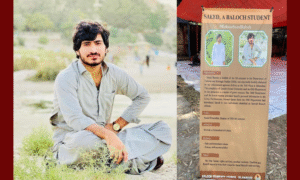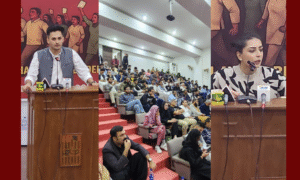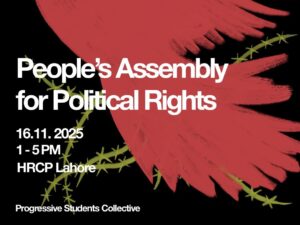Editorial Desk: Today marks the black day in the history of student politics when in 1984, General Zia-ul-Haq made a fateful decision that would change the course of this country’s political landscape. He banned student unions, robbing a generation of their right to engage in political activism and to voice their opinions on issues that mattered to them.
For decades before, student unions had been a vital part of the fabric of our society. They provided a platform for students to engage in democratic discourse, to learn about leadership and to participate in the political process. The ban on student unions was a blatant attempt by the military dictatorship to stifle dissent and to silence the voices of our youth.
It’s been 39 years since the ban was imposed, and the impact of this decision can still be felt today. The ban not only stifled political activism among students but also prevented the development of a new generation of leaders who could bring fresh perspectives and ideas to the country’s political landscape. The lack of student unions has contributed to the systemic problems that currently afflict Pakistan, including a lack of accountability, a weak civil society, and an absence of genuine political opposition.
As we mark this somber anniversary, it is time to reflect on the lessons we have learned and to consider what steps we can take to reverse the damage inflicted by this ban. The restoration of student unions must be a top priority for all those who believe in democracy and the importance of engaging the youth in the political process. It is also time to set the record straight on the misconceptions regarding student unions.
It is often reiterated that before the ban on student unions, campuses were covered in bloodbaths by the violence perpetrated by politically motivated student groups. This narrative, however, is a historical distortion and based on sheer propaganda. The history of student politics from ‘47-84 paints a completely different picture.
Amidst the decay of political parties, leadership and state institutions in Pakistan, student unions rose like a phoenix to fortify the democratic culture at both local and national levels. In a time where authoritarianism threatened to snuff out the very flames of democracy, student unions stood steadfast, serving as a bulwark against tyranny. These unions, officially recognized bodies, were powered by the tireless efforts of the student electorate, who every year participated in elections to determine their leaders. The student leaders, elected through a democratic process and guided by a set of rules and constitutions, were vested with the responsibility of representing the student community and maintaining direct correspondence with the university administration. And the universities, in turn, provided the necessary support to these student unions through a portion of the semester fee, including necessary funds and facilities. Thus, student unions served as a testament to the resilience and fortitude of the student community, steadfast in their quest to foster a democratic society.
The student unions were more than mere mediators between students and the university administration. They were beacons of resistance against the forces of authoritarianism and the establishment. Through a myriad of academic and extra-curricular activities, they nurtured the spirits of the young, empowering them with critical thinking and debating skills, while affording them opportunities for socio-political mobility.
From the time of independence in 1947 to the 1970s, student unions were at the forefront of political movements, acting as agents of change and rallying against the forces of dictatorship. However, with the advent of violent clashes, the influx of arms onto campuses, ethnic rivalries, religious extremism, and the state’s clampdown on student organizations, the student union movement was torn asunder. Violence was merely a result of Zia-led interference inside campuses, to rule out the threat of progressive voices, sowing the seeds of right wing fundamentalism. It was the state who oversaw the smuggling of US-made weapons inside universities through their puppet organisations, to make sure no student group dissent against its ‘Afghan Jihad’ policy. The violence, the bloodbath, the hooliganism on campuses today, is nothing but a planned outcome of state policy to curb progressive dissent. Today, an ultra-right fundamentalist student group, the Islami Jamiat Talaba, operates on the beck and call of state administration providing ground for baseless propaganda against student unions.
Progressive Students’ Collective staged a 21-days long sit-in last year in front of Punjab Assembly for the restoration of student unions. It gained widespread coverage on national and international media. Despite political representatives visiting the camp for photoshoots and promising to move a resolution in the provincial and national assembly, nothing concrete has been heard from the state so far. The Sindh government passed a bill last year to revoke the ban on student unions in Sindh. It’s been a whole year, but the government could not push the university administrations to make arrangements for the elections of unions. At present, students led by National Students’ Federation (NSF) are sitting on Charing Cross demanding that the ban imposed by a military dictator be repealed and students be allowed to unionise.
It has been argued by some lawmakers and activists that there in fact is no legal value of the ban, what so ever. Yet, the debate on the nature of this ban and the way around it has been subjected to the politics of elections. Students were assured by the PML-N representatives when in opposition last year that they would pursue this case first thing after coming to power. PPP scion, Bilawal Bhutto, promised the same. And nothing has come out of it.
The state is completely oblivious to the grievances of students who have been pushed to the edge in the current economic crisis. No political party has a solid agenda to deal with the issues of students inside campuses. The higher educational budget keeps facing annual cuts, while more and more subsidies fall in the court of the elite. Gender and religious minorities in campuses are harassed on a regular basis but have no viable platform to raise their voices. Hostels and mess facilities in public sector universities keep deteriorating while private universities continue looting students and parents. No good can be expected from our political elite who are busy clutching the thrones of power. It is up to us, the students, to come together and demand our right to unionise. Resistance is the only way forward for us. Let us all unite and force the state to revoke the ban on student unions.
Long Live Student Power
Long Live Student Resistance




